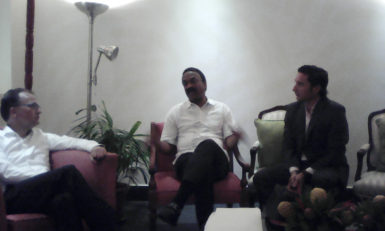Legal practitioners from around the Caribbean will this week be educated on the ways in which international private law can be used to protect families and business across borders when Attorney General Basil Williams in collaboration with the United Nations Children’s Fund (UNICEF) hosts The Hague Convention Conference here from July 13 to 15.
The conference, which is being held under the theme “International Family Law, Legal Cooperation and Commerce: Promoting Human Rights and Cross Border Trade in the Caribbean through The Hague Conference Conventions,” will address the issues such as international adoptions, spousal abductions, and the enforcement of spousal and child maintenance rulings across international borders.
Secretary General of The Hague Conference on Private International Law, Christophe Bernasconi, who is in Guyana ahead of the conference, told members of the media yesterday that the body, which is the world organisation for cross-border cooperation in civil and commercial matters, has since its formation in 1893 worked to unify private international law through the implementation of several multilateratal conventions.

“The beauty of private international law is that you can you can think of it as a bridge or as a road sign, which tells you which law to apply—is it the law of Canada or the UK or Guyana? Which court has jurisdiction? Think of it as a bridge but at both ends of the bridge the domestic law remains the same. We don’t interfere with domestic law. We have uniformity while respecting diversity. All these conventions do is establish a network of cooperation between authorities and designate jurisdiction,” he said
He further noted that the Conference, which currently has 81 member states, counts 148 states as signatories to its international instruments.
Williams noted that Guyana is a cross-border country, with citizens living in countries all over the world who are building families and businesses. He explained that often these citizens return to Guyana at the end of these relationships or with the hope of extending these businesses, at which point the issue of cross border legal cooperation arises.
“There are numerous cases in our society to which these conventions are relevant,” he stressed.
Williams also noted that he is interested in seeing Guyana become the first Caribbean member of the conference.
Asked if this is a matter he would be raising at the level of the legislature, Williams said that he would raise it at Cabinet, where he does not foresee any objections being raised.
If the country were to become a member, it would have to go through a three stage process, beginning with a representative of the Guyana government expressing interest in membership to the Dutch Foreign Minister and ending with Guyana ratifying instruments of membership.





